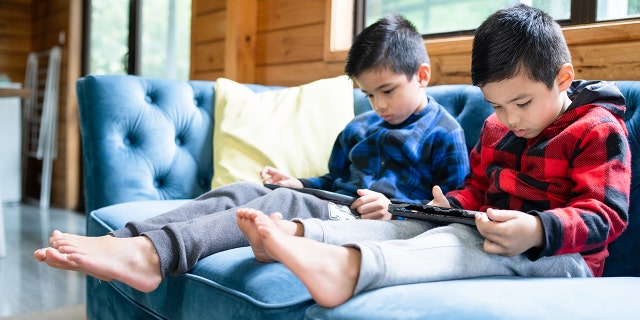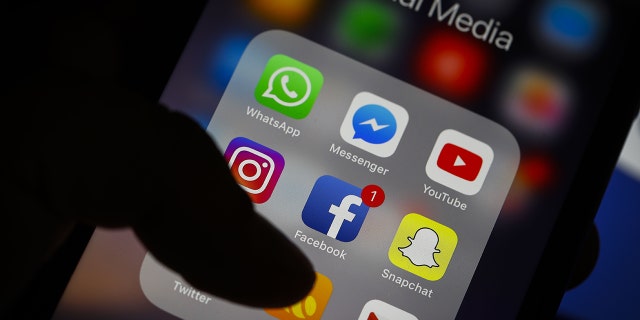
Kids’ screen time increased early in the COVID-19 pandemic amid lockdowns and stay-at-home measures.
But even after precautions were lifted and people resumed normal activities, it remained higher, according to a new study published on Feb. 15 in JAMA Network Open.
The study — led by Monique M. Hedderson, PhD, a research scientist at the Kaiser Permanente Northern California Division of Research — looked at the screen usage of 228 children aged 4 years to 12 years across three U.S. states.
LIMITING SCREEN TIME IN INFANTS MAY DECREASE RISK OF AUTISM SPECTRUM DISORDER, STUDY FINDS
Researchers compared screen times during three periods: pre-pandemic (July 2019 to March 2020), early pandemic (December 2020 to April 2021), and later in the pandemic (May 2021 to August 2021).

For kids between two and five years of age, the AACAP recommends a limit of one hour per weekday of screen time and three hours on weekends for non-educational screen time. (iStock)
Pre-pandemic, the average total screen time was 4.4 hours per day.
During the first pandemic period, it increased to 6.15 hours per day.
Later in the pandemic, kids spent an average of 5.51 hours per day on screens — still higher than pre-pandemic times.
These totals included both recreational and educational screen use.
For kids ages two and older, the American Academy of Pediatrics (AAP) recommends capping screen time at two hours per day.
Dr. Zeyad Baker, a New Jersey-based physician with over a decade of experience in pediatric medicine, is not surprised that the uptick in screen time has continued post-pandemic.
“Once a child forms a habit, it’s hard to break it,” he told Fox News Digital via email.
“There are a lot of unforeseen consequences of the pandemic — and one of them includes the dependency on screen time.”

Regardless of what’s on the screen, studies show that excessive media use can cause a number of problems for kids. (Cyberguy.com)
While screen time was already an issue prior to the pandemic with recreational use, the doctor said it’s even harder to limit now that kids rely on digital devices for their schoolwork.
What’s a healthy amount of daily screen time for kids?
For kids ages two years and older, the American Academy of Pediatrics (AAP) recommends capping screen time at two hours per day.
It discourages any use of media for children younger than age two, per its website.
The American Academy of Child & Adolescent Psychiatry (AACAP) outlines specific guidelines for each age group on its website.
TEEN SCREEN TIME MORE THAN DOUBLED DURING COVID-19 PANDEMIC, STUDY SAYS
For babies up to 18 months, it recommends limiting screen use to video chatting with an adult.
Between 18 and 24 months, its guideline is to use screens only for educational programming.
For kids between two years and five years of age, the AACAP recommends a limit of one hour per weekday and three hours on weekends for any non-educational screen time.
Numerous studies have linked excessive screen time to depressive symptoms in kids.
It does not specify an hourly limit for ages six and older but does recommend encouraging healthy habits and limiting screen-based activities.
“To be honest and point-blank, the least amount of screen time is healthy for children,” Dr. Baker told Fox News Digital.
However, he admitted that it gets trickier for parents to moderate when kids need to do homework online — and he believes the quality of screen time comes into play when setting limits.

The study looked at screen usage of 228 children aged four years to 12 years across three U.S. states. (Fox News)
“I think if you are doing family screen time on an educational level or if kids are using screen time to dig deep into valuable information and topics at a limited capacity, that is very different from watching and absorbing mindless content on the internet on a consistent basis,” Dr. Baker said.
Excessive screen time poses risks
Regardless of what’s on the screen, excessive media use can cause a number of problems for kids.
These include trouble sleeping, a decline in academic performance, reduced physical activity, headaches, eye strain and increased mood swings, per the Cleveland Clinic’s website.
KIDS AND OBESITY: NEW GUIDELINES RELEASED TO EVALUATE AND TREAT CHILDHOOD, ADOLESCENT WEIGHT ISSUES
“The short-term and long-term effects of excessive screen time include obesity and decreased social skills,” said Dr. Baker.
“In addition, we are seeing increased social anxiety and mental health issues in children and teenagers.”
Parents should not limit screen time in a way that comes across as punishment.
Numerous studies have linked excessive screen time to depressive symptoms in kids.
“It’s not a coincidence that we treat more mental health or social issues with children today than any medical issues we come across,” said Dr. Baker.
Tips for ensuring healthy screen times
Dr. Baker recommends only allowing children to have access to social media or certain television channels on the weekend and limiting screen time to academic-related content during the week.
However, he doesn’t think parents should limit screen time in a way that comes across as punishment.
CLICK HERE TO SIGN UP FOR OUR HEALTH NEWSLETTER
“Instead, they should encourage other activities, like going outside to play,” he said.
“Not only is that good for physical health, by adding activity and increasing vitamin D levels, but it’s also great for their mental health.”

One physician with over a decade of experience in pediatric medicine believes excess screen time may be linked to increased social anxiety and mental health issues in kids and teenagers. (Muhammed Selim Korkutata/Anadolu Agency/Getty Images)
Dr. Yamara Coutinho, a physician at Nemours Children’s Health in Pennsylania, suggests keeping kids’ bedrooms unplugged and media-free as much as possible.
They should also turn off devices during meals and treat media as a privilege, she said.
“Parents can also set a good example by limiting their own device use, especially when they’re with their kids,” she said.
CLICK HERE TO GET THE FOX NEWS APP
“It’s also a good idea for parents to preview apps, video games, TV shows and movies before their kids watch or use them,” she added.

 Latest Breaking News Online News Portal
Latest Breaking News Online News Portal




